Blizzard’s ban of Hearthstone player Blitzchung was misguided, but it’s only part of the problem
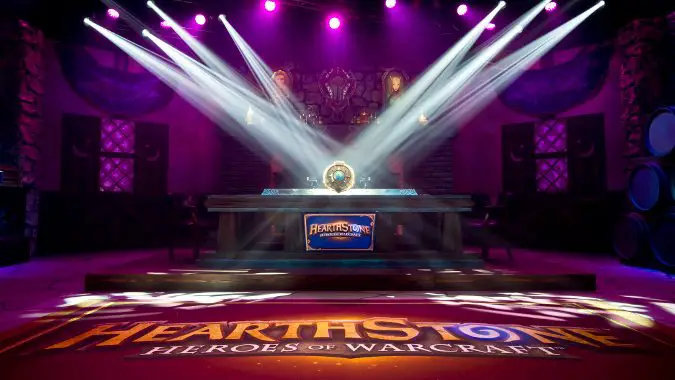
Update: This story has been updated to include Blizzard’s follow-up statement on the event, as well as analysis on how it fits in with the ongoing story.
Chances are you already know the basics of this story. After yelling “liberate Hong Kong, revolution of our age!” during an interview at Hearthstone’s Asia-Pacific Grandmasters tournament, Chung Ng Wai (Blitzchung) was banned from competing in Hearthstone esports for a year, and Blizzard rescinded $10,000 in prize money. Despite the punishment, Blitzchung stands by his actions: “What I have lost in Hearthstone is four years of time. But if Hong Kong loses, it would be the matter of a lifetime.”
Blizzard’s initial statement on the matter and its unapologetic follow-up statement have been cold to say the least. While Blizzard has reduced Blitzchung’s original punishment: the company returned his prize money and reduced his suspension to six months. In its follow-up statement, Blizzard assured us that this wasn’t about Hong Kong — but it’s all about Hong Kong.
If you haven’t kept up with the news cycle, Hong Kong is in the midst of an upheaval that started this June with a bill that would have expanded China’s influence. The pro-democracy protests have only escalated since: police and protesters continue to clash, sometimes violently, and gestures of support have come from around the world.
Just not from Blizzard’s world.
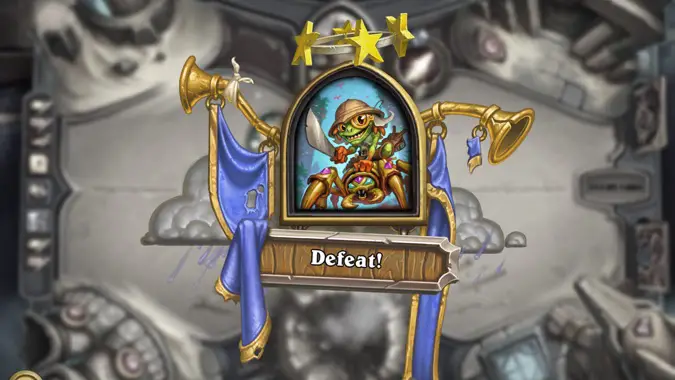
Punishment was meted out quickly
Blitzchung’s words were met with a shockingly harsh reprisal. Hearthstone bans are uncommon, and bans of this severity are unheard of. Two professional players — Roger and Reall — were suspended earlier this year for a more serious offense. They were win-trading and stream sniping — or, in simpler terms, cheating to give themselves a competitive advantage. The duo had been doing it for over a year before getting the ban, and they were only banned from the Grandmasters tournament — they could still participate in other Hearthstone esports events and they were allowed to keep their winnings. Blizzard even praised Roger for his gameplay, saying that he “earned his championship at HCT Winter and his spot at the upcoming HCT 2019 World Championship on his own merit” despite the cheating.
Even Blitzchung’s reduced sentence is still severe: he’s now banned from all competitive Hearthstone play for only six months (rather than simply being banned from a single tournament) and his winnings have been reinstated. It’s a nod to the fact that Blitzchung played fairly and earned those winnings, but a six month ban is still enough to make it extremely hard to get back in competition. Reducing the ban looks good, but the result is still the same: we’re unlikely to see Blitzchung return to competitive play.
This kind of punishment for behavior — rather than for cheating — is possible due to some fine print in the Grandmasters competition rules that state:
Engaging in any act that, in Blizzard’s sole discretion, brings you into public disrepute, offends a portion or group of the public, or otherwise damages Blizzard image will result in removal from Grandmasters and reduction of the player’s prize total to $0 USD, in addition to other remedies which may be provided for under the Handbook and Blizzard’s Website Terms.
If you take the rules as they’re written, Blizzard is saying that a statement supporting democracy in Hong Kong is offensive and damaging, thus worthy of punishment.
That’s quite a thing from Blizzard, whose mission statement stresses the importance of every person, the value of every voice, the passion of the global community, and the responsibility for ethical leadership. “As one of the world’s leading game companies, we’re committed to making ethical decisions, always keeping our players in mind,” the mission statement reads. “And setting a strong example of professionalism and excellence at all times.”
But Blizzard’s response to the original statement stresses that they do hold to their corporate values, and their esports programs are a further expression of those values. Every voice still matters — as long as it’s off stream:
The official broadcast needs to be about the tournament and to be a place where all are welcome. In support of that, we want to keep the official channels focused on the game.
What Blitzchung said, according to Blizzard, wasn’t part of the problem:
The specific views expressed by blitzchung were NOT a factor in the decision we made. I want to be clear: our relationships in China had no influence on our decision.
But if you go back to the rule Blizzard originally used to punish Blitzchung, there’s some cognitive dissonance. The rules say he was banned for an action that “brings you into public disrepute, offends a portion or group of the public, or otherwise damages Blizzard image.” The rules don’t say you aren’t allowed to express personal opinions: they say you can’t be offensive or damage Blizzard’s image. This certainly suggests that Blitzchung’s words were a problem, and that expressing pro-democracy sentimentis offensive and damages Blizzard’s image.
It’s a statement that talks around the issues and deflects blame — and what Blizzard has done is only the beginning of the story.
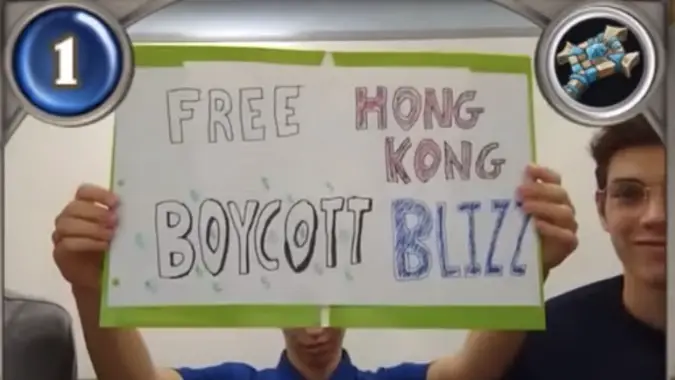 Let the boycotts begin
Let the boycotts begin
It’s no surprise that Blizzard fans around the world have responded. They’re deleting their accounts, burning their game boxes, and #BoycottBlizzard has been trending on Twitter. Between Twitter and Reddit, people are reporting that they can no longer use the words “Hong Kong” in their Battletags and are getting 1,000 year bans for mentioning Hong Kong on the forums. The internet is packed with angry messages and memes disparaging — to put it mildly — the way Blizzard has bowed to China’s will.
Overwatch’s Mei — the game’s only Chinese hero — has become a rallying cry for protesters. Art and images of Mei show her dressed like a protester and talking — or all-caps yelling — about liberation for Hong Kong. Turning Mei into a pro-democracy symbol is about more than just memes: protesters think it could get Overwatch banned in China. The country has a history of censoring content that speaks against the government — even Winnie the Pooh is banned due to memes associating him with Chinese President Xi Jinping. Banning Overwatch because of a character becoming a pro-democracy rallying cry really isn’t a stretch.
And the protests aren’t slowing down. During the collegiate Hearthstone championship, the American University team held up a sign that said “Free Hong Kong, Boycott Blizz.” No action has been taken against the team, likely because TeSPA — which runs the collegiate tournaments — has different rules for player behavior. (Notably, TeSPA’s rules don’t include the draconic language Blizzard leaned on to ban Blitzchung.) But AU showed more integrity than Blizzard itself: the team forfeited the match and the rest of the season, saying it was hypocritical for them not to be punished for essentially the same thing Blitzchung did.
Blizzard’s workers have jumped into the fray, too. Employees covered the “Think Globally” and “Every Voice Matters” statements printed around the Orc statue in front of Blizzard headquarters, which is the Blizzard fan equivalent of defacing a holy symbol. Employees also staged a small walkout, with about 30 people gathering at the Orc statue in protest — in full view of executive offices.
And Blizzard’s full-time employees aren’t the only ones upset by the decision. Two prominent Hearthstone casters — Brian Kibler and Nathan Zamora — have both stepped down from Hearthstone casting. “That kind of appeasement is simply not something I can in good conscience be associated with,” explained Kibler, who was scheduled to cast the Grandmasters finals at BlizzCon. “I will not be a smiling face on camera that tacitly endorses this decision.”
While some have spoken out, others haven’t — or can’t. The assistant coach of Overwatch League’s Dallas Fuel condemned Blizzard’s behavior on Twitter, but was told to delete the message — suggesting, again, that the message, not the format, is the problem. And caster Simon Welch issued a rather dry statement saying “I do not have to agree with the actions or policies of my employer, partner, or service, to continue to be affiliated with them.”
But not everyone has been able to walk away unscathed. The casters hosting the interview with Blitzchung have been banned as well: Blizzard will no longer work with them, even on other Blizzard games. Since the original announcement, their punishment has been reduced to a six-month ban, but it’s still harsh. It’s possible the casters egged Blitzchung on — at minimum, they knew what he was saying — but this is another punishment that doesn’t seem to fit the crime.
For people who make their living from Hearthstone, protest is a privilege — and plenty of people can’t afford to lose a paycheck.
And the situation comes down to dollars and cents for Blizzard, too.
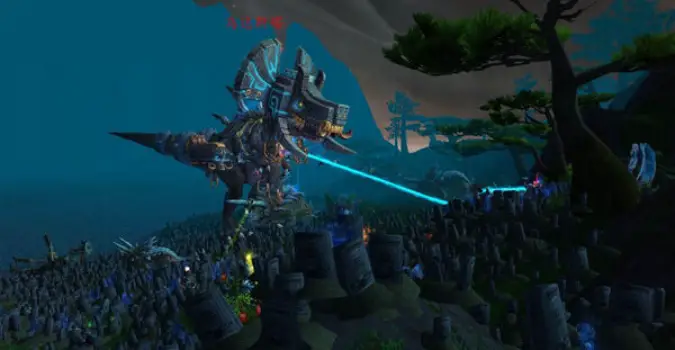
The cost of doing business in China
Free speech isn’t a right in China, and companies — including Blizzard — regularly modify content to appease Chinese censors. Skeletons, for example, don’t exist in the Chinese World of Warcraft client: Undead have flesh covering their bones and skeleton corpses are replaced with tombstones. Many of us have probably marveled at the creepiness of the graveyard that surrounds Oondasta — a world boss who was frequently defeated with a mad zerg of corpse running — or wished we could play own bone-free Undead.
It was censorship, but it was amusing censorship. It seems we’ve only now realized that censorship isn’t actually funny.
China is the world’s largest market for games and movies, which means most of our entertainment is filtered through a Chinese lens. With the amount of money to be made, no one wants to offend China.
It’s a problem that goes well beyond Blizzard, because every company that does business in China is doing the same — either they play by China’s rules, or they don’t play at all. Apple, which made $52 billion in China last year, recently pulled an app that helped Hong Kong protesters avoid police — and that’s only the most recent and most notable app the company has pulled to appease China. Tiffany & Co. recently scrapped an ad campaign showing a model covering one eye, which China felt supported a protestor who was shot in the eye earlier this year.
You’ll be hard-pressed to find a film studio that doesn’t go out of its way to please China — you won’t find any Chinese villains, but you will find more Chinese heroes — in order to get some of the country’s $8.9 billion box office. Companies that refer to Hong Kong, Taiwan, or Tibet as independent countries have been forced to apologize and change their information. Devotion, a game that upset China due to a hidden Winnie the Pooh meme, was pulled from all markets — including US — after just a week. And right now in esports, Riot Games is telling the public it’s not censoring League of Legends broadcasts while telling casters not to discuss “sensitive topics” during broadcasts.
All of that is just scraping the surface — the examples are endless.
“People who don’t live in China must either self censor or face dismissal and suspensions,” said Senator Marco Rubio in response to Blitzchung’s ban. “China [is] using access to market as leverage to crush free speech globally.”
It’s true. The massive size of China’s market has forced American companies to pander to them — and they’ve been doing it for years. It isn’t really a surprise that Blizzard bowed to pressure to silence Blitzchung. Asia makes up 12% of Activision Blizzard’s total revenue, and analysts estimate about two-thirds of that comes from China.
Follow the money: it leads straight to China, and businesses have done the math.
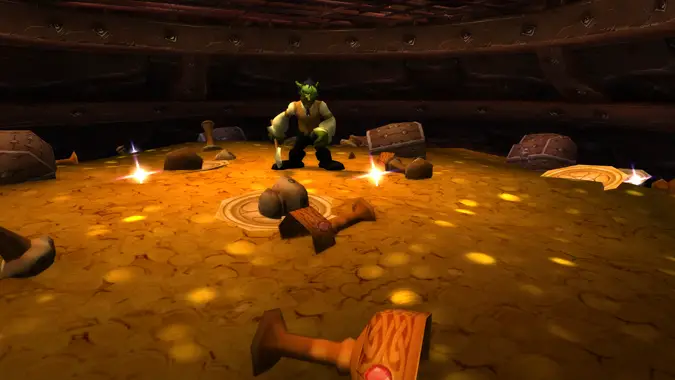
This wasn’t the only recent corporate misstep
Just a few days before Blitzchung was banned, the NBA found itself in a similar situation. Houston Rockets general manager Daryl Morey tweeted “fight for freedom, stand with Hong Kong,” a statement very much like Blitzchung’s.
The tweet was deleted and both Morey and the NBA apologized. Since then, the NBA has bounced back and forth about its stance on free speech, trying to appease both Americans who support a democratic Hong Kong and the Chinese government which doesn’t want to talk about it. (Blizzard, in its mEveryone has been trying to dial down the controversy: ESPN has banned commentators from talking about Hong Kong and NBA arenas confiscate pro-Hong Kong signs brought by attendees.
The strategy hasn’t worked. Now NBA merchandise has been pulled from store shelves in China and NBA pre-season games won’t air in the country. The NBA lost all of its Chinese sponsors, which meant before a Lakers-Nets game in Shanghai this week, they had to sand and repaint the court to remove corporate logos. The game had a pretty full house, but whether the NBA convinces China to back down or not is still in the air. About 10% of the NBA’s revenue comes from China, which is no small thing.
Compared to the NBA, Blizzard acted more quickly and more harshly to stamp out anti-Chinese sentiment. And though it backtracked a little in response to American backlash, it hasn’t apologized for its actions. This has apparently kept Blizzard in China’s good graces, even though the act has incensed the rest of its audience — and doesn’t quite fit with Blizzard’s corporate principles.
But that may not matter. We like to think of Blizzard as our friend, but it’s a multinational, multibillion dollar corporation. At the end of the day, money does the talking. According to the Washington Post, “We are not far from an age where the habits and demands of the Chinese middle class consumer will carry more weight than that of their US equivalent.”
Yikes.
https://twitter.com/youreSOLAbo/status/1181801729542615040
This is about more than Blizzard
I know a lot of people feel betrayed by Blizzard’s actions. The company, in trying to avoid political entanglements — and losing its Chinese audience — has essentially denounced democratic rights overseas.
And yet the real problem is that everyone is doing it. That doesn’t make it right, but it does make it difficult to stop. Every company doing business in China has to deal with this problem and they usually deal with it by doing as China asks.
Cancel your accounts if you want to. Never play a Blizzard game again if that’s what makes you feel better. Boycott and protest away. Hold Blizzard to account.
But recognize that’s just a start. Blizzard is just a small part of a huge geopolitical quagmire. The company is trapped between a rock and a hard place: doing the right thing and supporting Blitzchung would cost them money, whereas doing the wrong thing and crushing dissent against China is already costing them goodwill.
You don’t need to break out the calculator to see which side wins.
Please consider supporting our Patreon!
Join the Discussion
Blizzard Watch is a safe space for all readers. By leaving comments on this site you agree to follow our commenting and community guidelines.




